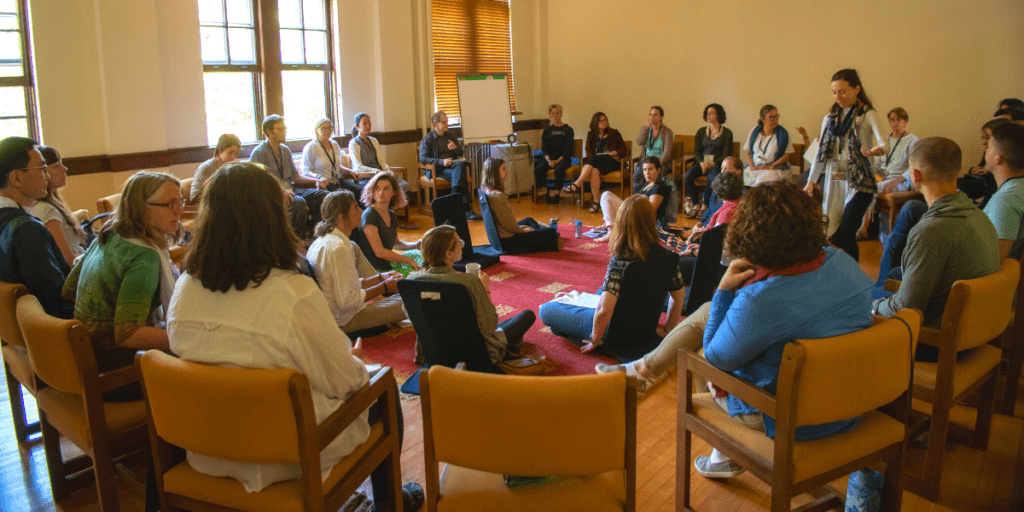
With roots in North America and western Europe, the field of contemplative science is now expanding around the globe. Despite this growth, not all researchers have access to the same knowledge, resources, and networks. And for those advancing new areas of inquiry, the experience can be an isolating, if not lonely, one. Researchers pioneering new pathways often crave the community and generative spirit that comes with being in the presence of like minds.
Mind & Life has long served as a professional hub, connecting multi-disciplinary researchers around the globe to each other and leading-edge areas of inquiry. Several international scholarship recipients at Mind & Life events recently shared with us what it means to be part of this expanding community, particularly during the COVID crisis.
“I found a home in Mind & Life,” said Ruth Levin-Vorster, a PhD Candidate in Neuroscience in the Department of Psychiatry and Mental Health at the University of Cape Town in South Africa. After an extensive career as a theater director and educator, Ruth began upskilling herself in social psychology, interpersonal neurobiology, and mindfulness and became an accredited mediator. In 2016, she developed a Theatre-based Relational Health Intervention that develops self-awareness in stressful relationships, while bringing emotions into balance with compassion.
Ruth, who attended Mind & Life’s 2019 Summer Research Institute (SRI), speaks of the importance of networking internationally, particularly given the field of social neuroscience is in its infancy in South Africa. The benefits extend beyond information gathering to nurturing a sense of collegiality, she says, adding Mind & Life convenings offer “a unique platform where science and the heart meet.”
The synergy and connection that come with this ‘meeting of science and heart’ help spark fresh insights, often opening up new opportunities. Pooja Sahni, a research scholar at the Indian Institute of Technology in Delhi, participated in the 2020 SRI, held virtually under the theme “Cultivating Prosocial Development Across the Lifespan.” As a result of relationships formed there, she’s actively engaged in a discussion group on contemplative ecology and ecological conservation.
Pooja reflects on SRI as offering an atmosphere of “authenticity and ease” where she felt encouraged to share her opinion freely. She went on to present her research in ecological education during a symposia at Mind & Life’s 2020 Contemplative Research Conference (CRC), hosted online. She and her co-presenters explored the influence of contemplative practices on human-nature relationships and sustainability.
At the CRC, she again experienced a sense of belonging. “I continued to get a feeling of openness and being part of a group rather than being pushed aside based on my ethnicity, experience, age, or gender,” she says.
Through ideas and relationships that emerged at both convenings, Pooja conceived of a project to study the effects of nature-based activity and mindfulness on the development of prosocial competencies in early childhood. She applied for and was recently awarded a Mind & Life Francisco J. Varela Grant to support her research looking into the role of ecological pedagogy in reducing aggression, enhancing respect for nature, and helping children regulate their emotions.
For others like Rocio Martinez Vivot in Argentina, connecting with like-minded peers re-affirmed her commitment to contemplative science at a time of political and economic challenges in her country, made only worse by the pandemic. “I am the only researcher in Argentina doing this kind of work,” says Rocio, who completed her PhD in Neuroscience and studies heart rate variability during meditative states. “It can be very difficult to create a workplace where I can share my findings with qualified people,” she says, adding it can be professionally isolating at times. Events like Mind & Life’s SRI and CRC “make you feel part of a community,” she adds.
Rocio came away from both events feeling more connected, with a greater sense of possibility. Inspired by many of the presentations, she’s now hoping to launch a research project exploring the use of meditation to facilitate earlier diagnosis of schizophrenia. Says Rocio, “Mind & Life reminds me that maybe my dreams are possible.”
*****
Mind & Life is grateful to the Hershey Family Foundation and an anonymous donor who support our efforts to strengthen the field of contemplative science globally through making scholarships available to Mind & Life events, on a case-by-case basis, to researchers and changemakers working internationally.

